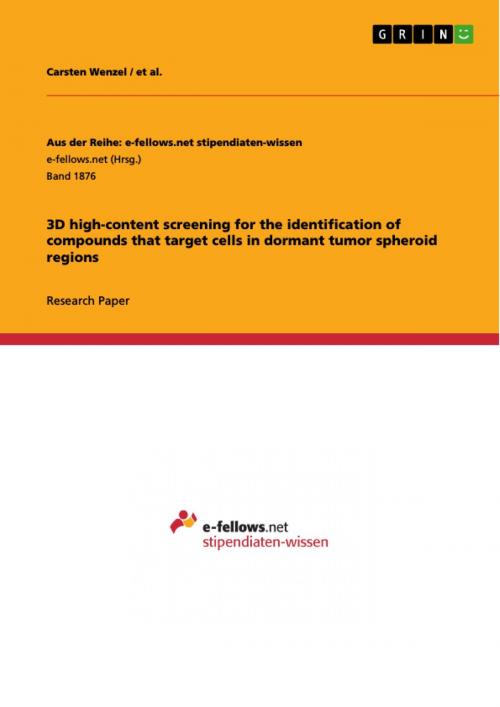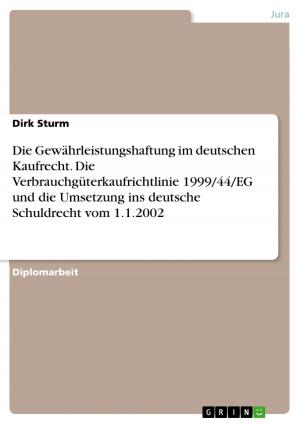3D high-content screening for the identification of compounds that target cells in dormant tumor spheroid regions
Nonfiction, Health & Well Being, Medical, Medical Science, Biotechnology| Author: | Carsten Wenzel | ISBN: | 9783668259133 |
| Publisher: | GRIN Verlag | Publication: | July 13, 2016 |
| Imprint: | GRIN Verlag | Language: | English |
| Author: | Carsten Wenzel |
| ISBN: | 9783668259133 |
| Publisher: | GRIN Verlag |
| Publication: | July 13, 2016 |
| Imprint: | GRIN Verlag |
| Language: | English |
Research Paper (postgraduate) from the year 2014 in the subject Medicine - Biomedical Engineering, , language: English, abstract: Cancer cells in poorly vascularized tumor regions need to adapt to an unfavorable metabolic microenvironment. As distance from supplying blood vessels increases, oxygen and nutrient concentrations decrease and cancer cells react by stopping cell cycle progression and becoming dormant. As cytostatic drugs mainly target proliferating cells, cancer cell dormancy is considered as a major resistance mechanism to this class of anti-cancer drugs. Therefore, substances that target cancer cells in poorly vascularized tumor regions have the potential to enhance cytostatic-based chemotherapy of solid tumors. With three-dimensional growth conditions, multicellular tumor spheroids (MCTS) reproduce several parameters of the tumor microenvironment, including oxygen and nutrient gradients as well as the development of dormant tumor regions. We here report the setup of a 3D cell culture compatible high-content screening system and the identification of nine substances from two commercially available drug libraries that specifically target cells in inner MCTS core regions, while cells in outer MCTS regions or in 2D cell culture remain unaffected. We elucidated the mode of action of the identified compounds as inhibitors of the respiratory chain and show that induction of cell death in inner MCTS core regions critically depends on extracellular glucose concentrations. Finally, combinational treatment with cytostatics showed increased induction of cell death in MCTS. The data presented here shows for the first time a high-content based screening setup on 3D tumor spheroids for the identification of substances that specifically induce cell death in inner tumor spheroid core regions. This validates the approach to use 3D cell culture screening systems to identify substances that would not be detectable by 2D based screening in otherwise similar culture conditions.
Research Paper (postgraduate) from the year 2014 in the subject Medicine - Biomedical Engineering, , language: English, abstract: Cancer cells in poorly vascularized tumor regions need to adapt to an unfavorable metabolic microenvironment. As distance from supplying blood vessels increases, oxygen and nutrient concentrations decrease and cancer cells react by stopping cell cycle progression and becoming dormant. As cytostatic drugs mainly target proliferating cells, cancer cell dormancy is considered as a major resistance mechanism to this class of anti-cancer drugs. Therefore, substances that target cancer cells in poorly vascularized tumor regions have the potential to enhance cytostatic-based chemotherapy of solid tumors. With three-dimensional growth conditions, multicellular tumor spheroids (MCTS) reproduce several parameters of the tumor microenvironment, including oxygen and nutrient gradients as well as the development of dormant tumor regions. We here report the setup of a 3D cell culture compatible high-content screening system and the identification of nine substances from two commercially available drug libraries that specifically target cells in inner MCTS core regions, while cells in outer MCTS regions or in 2D cell culture remain unaffected. We elucidated the mode of action of the identified compounds as inhibitors of the respiratory chain and show that induction of cell death in inner MCTS core regions critically depends on extracellular glucose concentrations. Finally, combinational treatment with cytostatics showed increased induction of cell death in MCTS. The data presented here shows for the first time a high-content based screening setup on 3D tumor spheroids for the identification of substances that specifically induce cell death in inner tumor spheroid core regions. This validates the approach to use 3D cell culture screening systems to identify substances that would not be detectable by 2D based screening in otherwise similar culture conditions.















